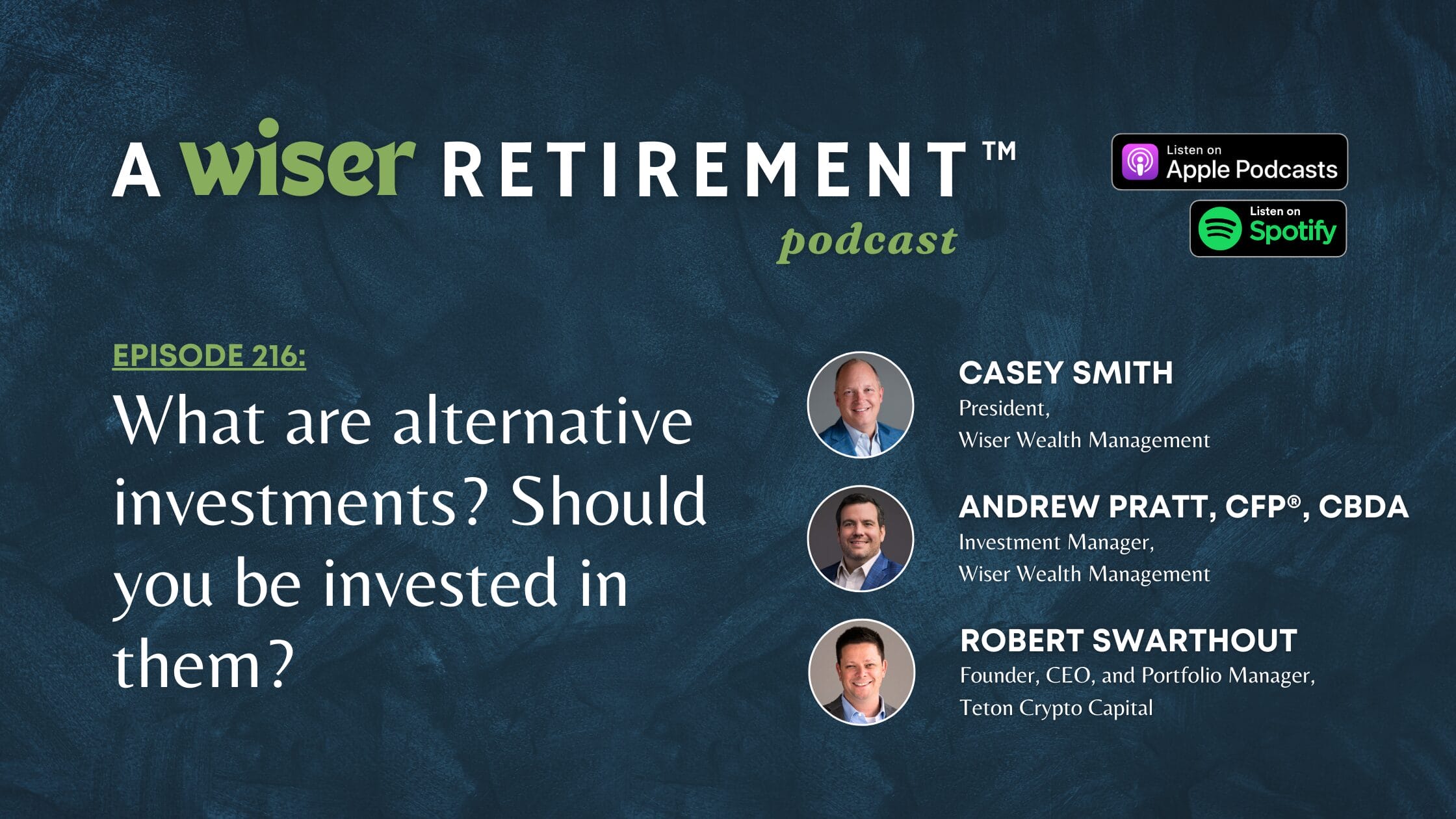
What are alternative investments? Should you be invested in them?
On this episode of A Wiser Retirement™, Casey Smith is joined by Andrew Pratt and Robert Swarthout. Andrew is the Investment Manager at Wiser and Robert is the Founder, CEO, and Portfolio Manager of Teton Crypto Capital. They talk about Andrew’s new CBDA designation, crypto volatility, Bitcoin ETF holdings, and alternative investments.
Listen or Watch:
Summary
Cryptocurrency Updates and News
- Grayscale, a digital currency asset manager, has experienced significant selling of their Bitcoin Holdings, which has resulted in a decrease in their holdings by about half.
- In the case of the Genesis bankruptcy, creditors are receiving their tokens back one for one, which is a first in crypto.
- JP Morgan recently announced that Bitcoin ETF Holdings have surpassed gold bullion holdings within client portfolios.
- February marked the largest nominal price increase in Bitcoin’s history.
- They talk about Bitcoin becoming the one world currency, but remind listeners about the inefficiencies in transaction fees and a lack of agreement among its users.
- They mention the the increasing correlation between crypto markets and the US Stock Market, due to the introduction of crypto ETFs.
- The SEC v Ripple case seems to be wrapping up, but the outcome is still uncertain. The potential fines being proposed could reach up to $2 billion.
What are different types of alternative investments?
Alternative investments include things like real estate, crypto, private equity, hedge funds, and collections. Ultra-high net worth families are the primary investors in these alternatives, however everyday investors are starting to explore options like commercial real estate and art investing.
Real Estate vs Crypto as Alternative Investments
Real estate investments offer cash flow components through rent payments or dividend yields, while crypto does not. There is a liquidity differences between the two, with real estate having longer time to liquidity and private investments offering a liquidity return premium due to their illiquid nature. The benefits of alternative investments include a liquidity return premium, diversification benefits, and access to different market segments and higher yields.
Private Credit, Private Equity and Hedge Funds
Private credit specifically caters to small to midsize companies that cannot access capital from banks or leverage loans, and offers higher returns due to the urgency of the businesses’ need for capital. Private equity and hedge funds also offer similar benefits to private credit, but with different investment strategies.
Private equity involves buying and growing companies that are not publicly traded, creating synergies through cost cutting and operational efficiencies, and eventually selling them at a higher multiple. Hedge funds, on the other hand, aim to hedge risk by using various strategies such as long-short positions, expanding the investment universe, and reducing market risk. Despite the potential benefits, some argue that the high fees and lack of transparency make it difficult to justify investing in hedge funds or private equity, especially when compared to low-risk options like short-term treasuries.
Structured Products: High Fees and Lack of Transparency
Structured products are a basket of underlying securities created by a bank and syndicated out to investors. Investors may be attracted to structured products due to the perceived guaranteed returns and downside protection, but keep in mind that there are fees associated with these investments and that the upside is capped. These investments may provide a false sense of security due to delayed valuations and potential markdowns. High fees and a lack of transparency are reasons why these products may not be compelling additions to your portfolio.
Invest for the Long Term
Wealthy people’s investment portfolios don’t necessarily outperform due to superior investment knowledge, but rather because they have larger portfolios and the ability to weather market volatility. There is a place for alternatives in a portfolio, but the allocation should be carefully considered and managed by a competent team. Keep in mind that it can be challenging to find high-performing private equity investment opportunities and always evaluate the risks involved. Whatever you do, don’t get caught up in get-rich-quick schemes.
Links:
- Connect with Robert Swarthout: info@tetoncryptocapital.com, https://www.tetoncryptocapital.com/
- Click here to download one of our free guides that covers financial planning topics like retirement, investing, taxes, divorce, and more!
Connect:
- Click here to schedule a consultation with one of our financial advisors.
- Follow us on social media: Twitter, Instagram, Facebook, LinkedIn, and YouTube.
- Learn more about A Wiser Retirement™ podcast and access previous episodes.
Share This Story, Choose Your Platform!
Wiser Wealth Management, Inc (“Wiser Wealth”) is a registered investment adviser with the U.S. Securities and Exchange Commission (SEC). As a registered investment adviser, Wiser Wealth and its employees are subject to various rules, filings, and requirements. You can visit the SEC’s website here to obtain further information on our firm or investment adviser’s registration.
Wiser Wealth’s website provides general information regarding our business along with access to additional investment related information, various financial calculators, and external / third party links. Material presented on this website is believed to be from reliable sources and is meant for informational purposes only. Wiser Wealth does not endorse or accept responsibility for the content of any third-party website and is not affiliated with any third-party website or social media page. Wiser Wealth does not expressly or implicitly adopt or endorse any of the expressions, opinions or content posted by third party websites or on social media pages. While Wiser Wealth uses reasonable efforts to obtain information from sources it believes to be reliable, we make no representation that the information or opinions contained in our publications are accurate, reliable, or complete.
To the extent that you utilize any financial calculators or links in our website, you acknowledge and understand that the information provided to you should not be construed as personal investment advice from Wiser Wealth or any of its investment professionals. Advice provided by Wiser Wealth is given only within the context of our contractual agreement with the client. Wiser Wealth does not offer legal, accounting or tax advice. Consult your own attorney, accountant, and other professionals for these services.





